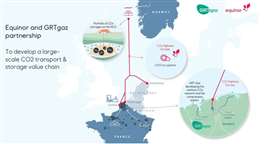CO2 pipeline planned for Dunkirk
June 18, 2024
Equinor, GRTgaz system would send CO2 to Norway

Equinor and main French gas transmission operator GRTgaz plan to develop a CO2 transport system for captured CO2 from industrial emitters in France to permanent storage offshore Norway via the planned CO2 Highway Europe pipeline project.
The development will consist of a network of onshore CO2 pipelines, to be developed by GRTGaz, which will connect France’s Dunkirk industrial area to Equinor’s CO2 Highway Europe, a large-scale CO 2 pipeline being planned by Equinor also connecting Zeebrugge, Belgium to a portfolio of storage sites under the seabed offshore Norway.
The project under the agreement aims to help decarbonize the Dunkirk industrial area which accounts for around 20% of France’s industrial CO2 emissions.
Specifically, GRTgaz will develop a 30 km onshore pipeline network in the Dunkirk region, a compressor station in Dunkirk sending the CO2 into the offshore pipeline connecting to the CO 2 Highway Europe.
The capacity in the initial phase will be 3 to 5.5 million tonnes of CO2 per year, and the capacity can be expanded to also accommodate CO2 captured at other industrial clusters in France.
“For industries that cannot decarbonize directly through clean power, Carbon Capture and Storage (CCS) offers a viable solution,” said Grete Tveit, senior vice president Low carbon solutions, Equinor. “By building CO2 transport and storage solutions at an industrial scale together with GRTgaz we can help carbon-intensive industries in France to continue developing and securing jobs and value creation in a sustainable future. The collaboration also strengthens the viability of the CO2 Highway Europe project as the French connection will further strengthen economies of scale.”
Equinor and GRTgaz will cooperate in the development of their CO2 transmission and storage infrastructures and associated services: network planning, technical design and industrial safety, interoperability, regulatory aspects and institutional relations. Feasibility studies are currently under way, with the aim of launching basic engineering studies at the end of 2024 and commissioning in 2029.
In France, this project is in line with the proposed government’s strategy (France 2030) for the capture, use or permanent geological storage of carbon (CCUS) and with the desire to step up collaboration between France and Norway on green industrial transformation, in accordance with the strategic partnership signed between the two countries in January.
MAGAZINE
NEWSLETTER
CONNECT WITH THE TEAM






